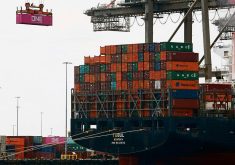Reuters — The slow pace of crop sales by farmers that has hurt two of the world’s biggest grain traders will likely stretch into next year, the head of Bunge Ltd said on Thursday.
The forecast for sluggish sales from Chief Executive Officer Soren Schroder may mean that Bunge and agribusiness rivals, including Archer Daniels Midland Co and Cargill Inc, will continue to feel economic pressure from limited supplies despite massive grain harvests in the United States.
U.S. farmers will market larger-than-normal per centages of their newly harvested corn and soybeans next year, as they delay autumn sales because of weak prices, Schroder said in an interview with Reuters.
Read Also

U.S. grains: CBOT futures extend gains as cold weather hits U.S.
Chicago grain and oilseed futures rose on Friday as severe cold in U.S. and other areas of the world raised fears about damage to crops and disruptions to processing plants.
Normally, U.S. farmers market their grain during the fall harvest, before spring planting, or after the planting is done. But the volumes of grain being sold, Schroder told Reuters, “are shifting a bit in between those three traditional marketing periods.”
Schroder’s comments came after the company reported lower-than-expected third-quarter earnings due in part to sluggish farmer selling. Bunge buys, sells, transports and processes crops.
In Brazil, growers have marketed only about 10 per cent of their new-crop soybeans, compared to the normal level of 30 per cent or more, Bunge Chief Financial Officer Drew Burke told analysts on a conference call to discuss earnings.
Argentine farmers are holding soybeans as a hedge against inflation and currency devaluations, he said.
Bunge does not expect to see a pick-up in farmer selling in Brazil or Argentina until early next year “unless there were to be a sizable price or currency movement,” Burke said.
Cargill, a top global commodities trader, said earlier this month that returns in its origination and processing business during a fiscal first quarter ended Aug. 31 had slipped as farmers held back grain sales. The company said it was poised to benefit from replenished grain supplies as the U.S. harvest advances in its second quarter.
Bunge, along with ADM, Cargill and Louis Dreyfus Corp, comprise the four large global grain players, dubbed the “ABCD,” that dominate the flow of agricultural commodities around the world.
Farmers are able to postpone sales after expanding their storage capacity and because many are flush with cash after grain prices soared in recent years.
For global traders, the slow pace of selling is “definitely a negative in terms of their ability to be opportunistic buyers of grain,” said Ryan Oksenhendler, an analyst for Arlon Group, a New York-based firm that invests in agricultural commodities and owns Bunge shares.














